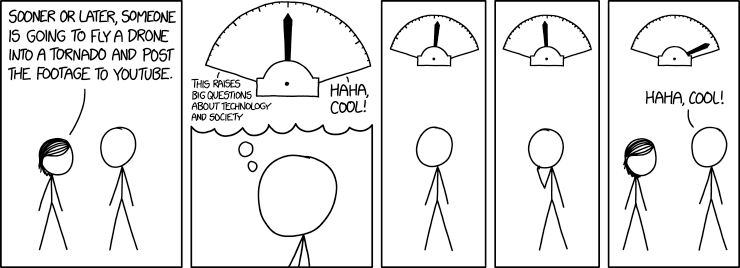Evaluating Tech Things

Also known as the Black Mirror-Mythbusters scale.

Also known as the Black Mirror-Mythbusters scale.
The rapid pace of technological advancement frequent raises the possibility of doing things that were either impossible, or at least impractical, for all of human history. In many cases, these new possibilities are exciting and fun, but at least some of them present major concerns about how they'll impact society. Things like atomic fission, the Internet, CRISPR technology, are amazing things we have learned how to do, but they also have the potential, in some cases already realized, of massively affecting human life (e.g. nuclear annihilation, instant wide-scale communication, elective genetic engineering), both for the better and for the worse.
Here Cueball, upon hearing of a cool idea he hadn't thought of before, mentally measures it on a scale to decide if he can be excited about it, or should be worried about how it might affect humanity. This process is represented by an analog meter with one extreme labeled "This raises big questions about technology and society", and the other simply labeled "Haha Cool!". After weighing it out, he decides it's just plain cool and it will not adversely affect humanity at all. In the comic, it appears this mental decision took awhile, judging by the multiple panels showing him thinking, ambivalently rubbing his chin as the dial oscillates left and right, before he gives his response.
The title text refers to this mental weighing also being known as the Black Mirror–Mythbusters scale. Black Mirror is a British anthology series, mostly falling into the genre of near-future science fiction. Most episodes with the impacts of current and/or potential technology on society, usually focused on the negative and even destructive effects that technological change can have.
Mythbusters was a long-running science education/entertainment program in which the hosts explore myths, urban legends, and other various claims and concepts by designing and building experiments to test them. The show was famous for advancing the notion of experimentation to a broad audience, as well as for the elaborate and often exciting experiments they conducted (including a large number of dramatic explosions).
Randall appears to use Black Mirror as an emblem of the frightening and dangerous aspects of science and technology, and Mythbusters as a benchmark for having fun with science by using it to do cool things.
Worrying about the effect that technology has on our lives is a theme that has been explored before, in 1215: Insight.